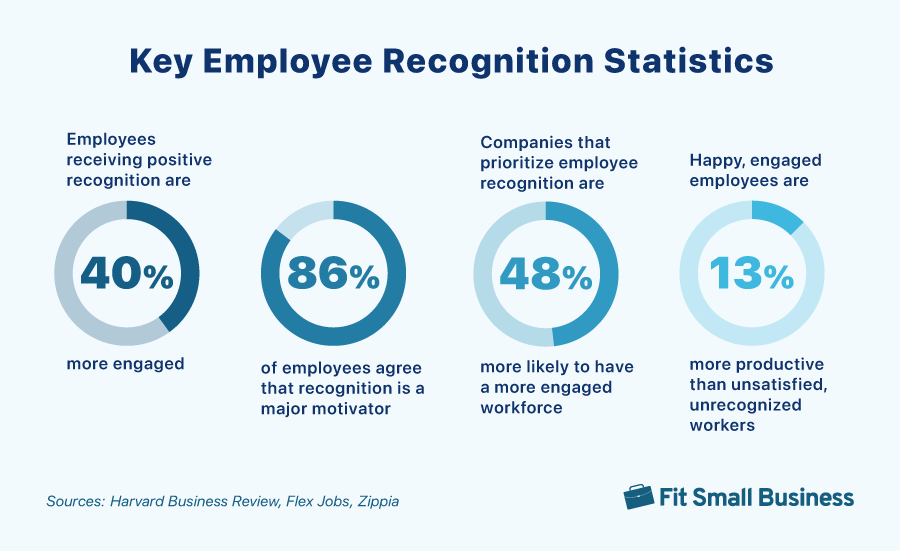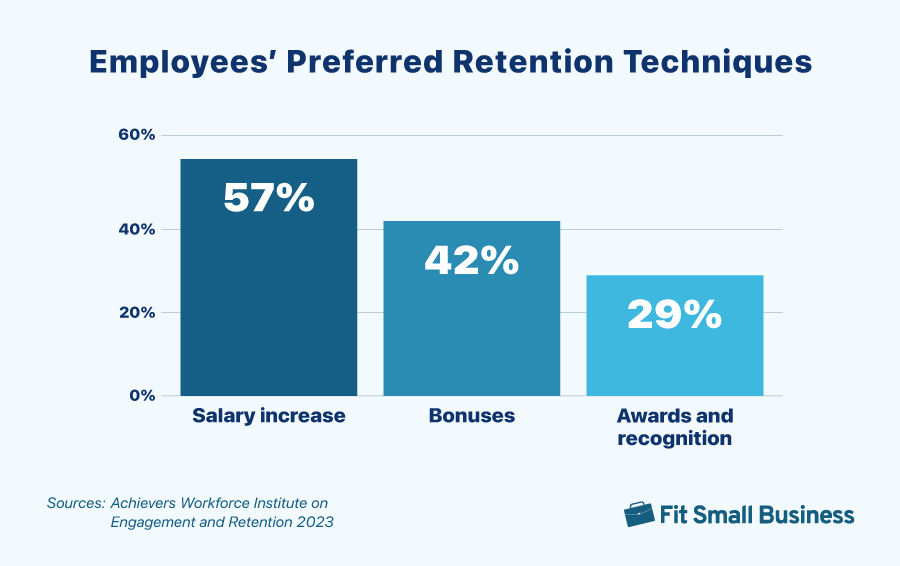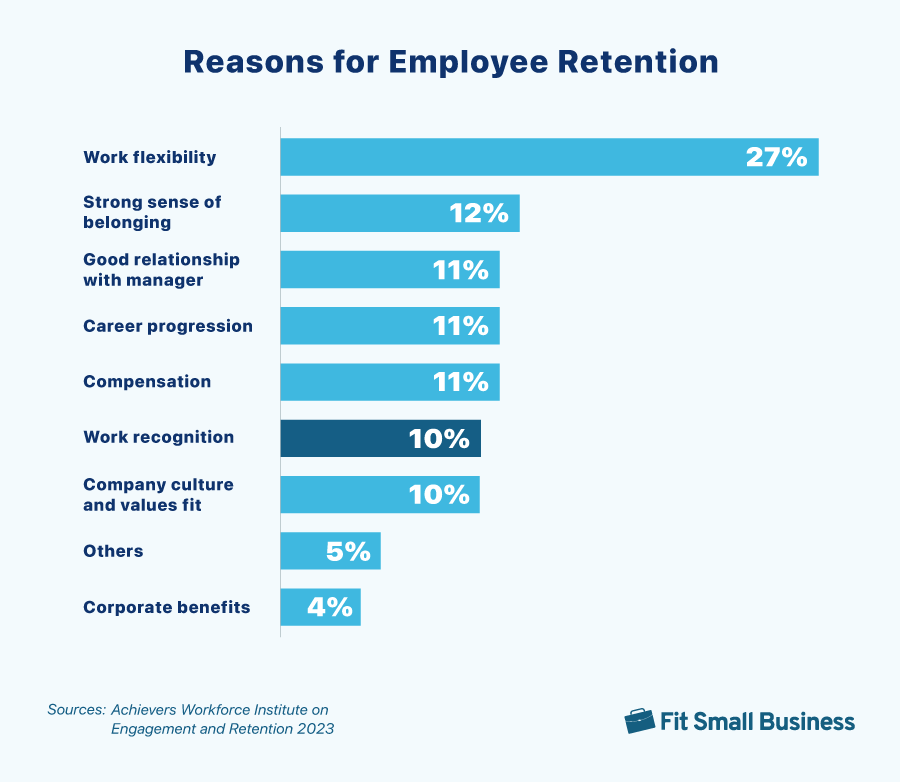Employee recognition has a profound impact on an organization’s culture, employee retention, and overall performance. The following statistics tell us that effective employee recognition not only boosts morale and motivation but also fosters a positive workplace environment, leading to increased productivity, job satisfaction, and a greater sense of loyalty and commitment to the organization.
Key Takeaways:
- Employee recognition significantly boosts engagement, with recognized workers being up to 40% more engaged than those who receive little appreciation.
- Prioritizing recognition reduces turnover costs, as recognized employees are far less likely to leave and experience burnout.
- Companies with robust recognition practices experience higher productivity, performance, and engagement levels.
- Increasing employee recognition can drive an increase in profit margins for an organization.

Employee Recognition and Engagement
Effective employee management encompasses several key practices, including providing meaningful recognition and rewards. Recognition boosts morale, provides a sense of achievement, and increases job satisfaction, creating a positive feedback loop that cultivates a healthy workplace culture. As a result, productivity and performance improve.
Here are some statistics that prove employee recognition is an effective tool for businesses.
- According to a Harvard Business Review study, employees whose managers excelled at providing positive recognition were at least 40% more engaged than those with managers who fell short in this area.
- FlexJobs survey results mirror this finding: 86% of workers admitted that recognition in the workplace is a major driver of motivation.
- According to the Achievers Workforce Institute, in 2023, 39% of HR professionals prioritized recognition and awards to engage and retain employees.
- Workers who are frequently praised and acknowledged for their efforts are 20 times more likely to be engaged and committed to their jobs compared to those who rarely receive appreciation or positive feedback.
- When employees receive recognition for their efforts, they are 18 times more likely to feel motivated and inspired to produce exceptional work.
- 57% of employees say salary or wage increases would make them more likely to stay at their job, while 42% want bonuses, and 29% desire rewards and recognition.

- Happy, engaged workers are 13% more productive than unhappy, disgruntled employees.
- Companies that make effective employee recognition a priority are 48% more likely to foster a highly engaged workforce deeply committed to their jobs.
Employee Recognition and Turnover Rate
Employee recognition programs are a core component of effective employee incentive programs, providing both monetary and non-monetary rewards to motivate and reinforce desired behaviors and performance. Recognition has a significant impact on employee retention and lowering turnover rates, which can save organizations substantial amounts of money.
The costs associated with recruiting, hiring, and training a new employee significantly exceed the annual salary for that role. Thus, it is financially feasible for organizations to prioritize retaining existing employees rather than continually hiring new personnel to fill vacancies.
- In 2023, 10% of employees surveyed cited recognition at work as one of the top reasons to stay at their current job.

- Studies conducted by Gallup and Workhuman revealed that employees who firmly believe recognition is a vital component of their company’s culture are nearly four times more likely to be highly engaged in their roles. These same employees are about 68% less likely to experience frequent feelings of burnout, minimizing turnover rates.
- An Indeed survey revealed that 30% of individuals who left their job within the first six months would have stayed longer if their contributions were better recognized.
- According to a survey conducted by Nectar, 71% of employees said that they’re less likely to leave their company if they were recognized more frequently.
- The third most common reason employees decide to leave their jobs is due to a lack of recognition for their efforts.
- 31% of employers are increasing salaries and wages, 29% are offering rewards and recognition, 28% are offering more flexible schedules, and 28% are gathering employee feedback in order to retain employees.
Frequently Asked Questions (FAQs)
Employee recognition is crucial because it directly impacts employee engagement, satisfaction, and productivity. Statistics show that recognized employees are more likely to be motivated, loyal, and invested in their work, which contributes to a positive workplace culture and better business outcomes.
Employee recognition significantly affects turnover rates. Studies indicate that organizations with robust recognition programs experience lower voluntary turnover. Employees who feel valued and recognized are less likely to leave their jobs, saving companies the cost and disruption of replacing staff.
Yes, employee recognition can improve company performance. Research links effective recognition programs with higher employee engagement and productivity, which in turn can lead to improved customer satisfaction, increased sales, and higher profitability.
The most effective recognition is timely, frequent, specific, and aligned with company values. Both public and private forms of recognition can be effective, including verbal praise, written acknowledgment, awards, and tangible rewards. The key is to match the recognition with the employee’s preferences and the significance of their contribution.
No, employee recognition does not have to be expensive. Many forms of effective recognition, such as verbal praise, thank-you notes, or public acknowledgment, cost little to no money. The significance of recognition comes from its sincerity and relevance, not its monetary value.
The success of an employee recognition program can be measured through employee engagement surveys, turnover rates, productivity metrics, and feedback from employees. Regularly assessing these factors can help organizations adjust their recognition strategies to be more effective.
Bottom Line
Employee recognition is more than just an HR policy; it’s a strategic tool that can elevate your SMB to new heights. The statistics highlighted in this article underscore the tangible benefits of building a culture of appreciation. By integrating meaningful recognition into your daily operations, you can unlock the full potential of your team and drive your business forward.